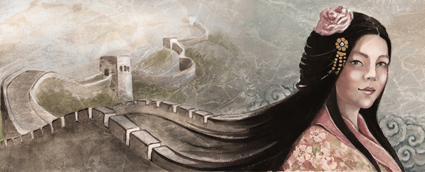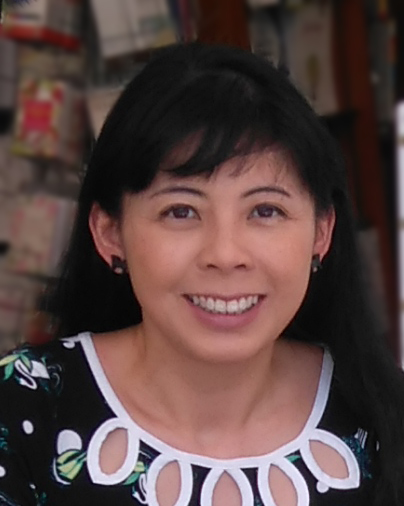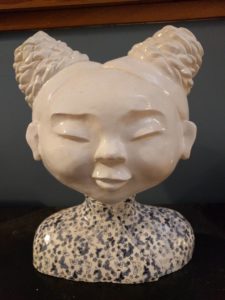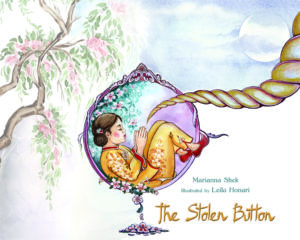
Conversations with Marianna Shek
Marianna Shek was one of the writers I approached when I decided to profile writers on (or should the preposition be ‘in’? Do you appear in or on…) this blog because I really wanted to continue the conversation that we started in Melbourne. I was immediately drawn to Marianna’s creative passion and energy. When you read this profile, you’ll find out just how multi-talented Marianna is.
We could have easily ended up with a novella-length interview if we’d allowed ourselves, but we decided to leave that for another day.

I met you at the Deborah Cass awards where I learnt that you are not only a writer but an animator, artist, researcher, university lecturer and, in a previous life, a pharmacist! How, when and why? I grew up in a traditional Chinese migrant household. My sisters and I were meant to be doctors, but it soon became apparent to my parents that I wasn’t going to amount to much when I kept bringing home A-minus grades, so they pressured me into pharmacy which I stuck at for many years.
I always knew I was meant to do something in the creative field. In my teens, I preferred sculpting and drawing to writing. The pharmacy degree paid for many artistic endeavours. I took a lot of TAFE courses – in ceramics and painting, before finally settling on a Bachelor degree in animation.I like to think I had a mature conversation with my parents about my change in career and that we all went away with much love, respect and a fresh perspective on the parent-child dynamic. Sadly, by the time I worked out what I wanted both my parents had passed away, sparing me the confrontation.
What are you working on at the moment? Like all writers, I have multiple projects on the go. I’m wrangling the second draft of a YA fantasy novel while doing what I hope will be the final edits on a choose-your-own-fairytale for middle-graders. I like having two projects at such different stages. Final stage editing is never much fun so it’s good to have a work in early development that lets you be more creative.
It turns out, writers are just really good at time management. Most creatives are juggling family, jobs, social life and time for themselves.
I’m curious about how writers, especially those who have day jobs and other responsibilities, write because I’ve yet to figure out a routine. I’m a night owl but not one that can wake up at 5 am to write as some of my friends do, so I write when my child is at school. What’s your writing routine like? This time of the year, every writer I know has posted a wish list of what they’ll achieve this year. I see some of their goals and think ‘Wow! To achieve all of these goals, you must be writing full time!’ It turns out, writers are just really good at time management. Most creatives are juggling family, jobs, social life and time for themselves.
I try to be flexible to suit my family needs and not set too many goals. I teach at uni so I have more time to write during the holidays —usually a couple of days a week while my toddler is in childcare. That’s when I try to do the bulk of my creative work. Once the uni trimester starts, I’ll be lucky to find eight hours a week to myself to write! During the teaching trimester, I’ll focus on blogging and churning out short stories.I started writing short stories to teach myself the craft of writing and became addicted.
What’s your response when people ask you ‘where are you from?’. Mine has changed over the years. I usually tell them where I was born or that I’m an ethnic Chinese, and then ask them the same question. I usually tell them the answer they expect. For some reason, the question has never prickled me the way it does some migrants. I’ve got friends who absolutely despise the question and avoid answering at all costs. Which leads to the usual conversation we’ve all hear a hundred times.‘Where are you from?… I mean, where are you REALLY from?… Okay, where were you born? .. Where were your parents born?’ Maybe I answer quickly, just to get it out of the way and move on.
I recently read a short article in The Economist’s The World in 2019 issue predicting that this year ‘complaints about cultural appropriation will begin to lose their sting’. Do you agree or have any opinion on cultural appropriation/misappropriation? I completely get it if you don’t want to pass on this question because I don’t think I can adequately address cultural mis/appropriation in anything less than a 5000-word essay. I’m also okay with a one-word answer. If you asked me five years ago, I’d shrug. Don’t open my mouth. Don’t cause waves. Let white people write about whatever they want. That’s the way I was brought up and even though I’ve had plenty of education and should be mature enough to override this instinct, some habits die hard.
Maybe one day you and I can talk about it over coffee but for now, I’ll point to this wonderfully articulate article, “How to Talk to Ghosts” written by R.F. Kuang. I’m not a crier but her cutting words resonate with me no matter how many times I read it.
I’ve been asked where I position myself as an Australian writer, and then as an Asian-Australian writer, if at all, so I’m going to ask you the same question. (I wasn’t able to answer on the spot for whatever reason but what I would have said is that it doesn’t really matter how I position myself because my identity is one that’s imposed by others).

I’m not exactly an extrovert, but I’ve always been a strong-willed character and have a strong sense of who I am. The idea that my identity was imposed on me by others is only something I’ve only recently considered.
In the past, people have always commented that my works carry an ‘Asian-flavour’. Ok, so this is a ceramic piece I did many years ago. In hindsight, it’s obvious there’s an Asian theme going on but at the time, it didn’t even occur to me. I’ve always just worked with what I know and who I am.
I’ve also recently published a Chinese fairytale picture book with my dear friend and artist Leila Honari.

Again, the mythical work is set on the Silk Road and the imagery is clearly a hybrid Chinese- Persian style. Despite my past record, I wouldn’t call myself an Asian-Australian writer!
Who are your favourite writers? I tend to love books over writers. It’s hard to pick a favourite because I’d have to love their body of work.
A writer that has consistently wowed me is Melina Marchetta. I’m a YA writer so I’m probably biased. I still remember picking up Looking for Alibrandiwhen I was in grade eleven and thinking she wrote that story for me. Every time I revisit her books, I still get the sense that she captures perfectly what it feels like to be on the precipice, poised for flight. That crossover point. Not a kid but not an adult. That’s what encapsulates YA.
What’s your idea of perfect happiness? I don’t want to tempt fate but I have to say I’m pretty happy right now. Perfect happiness is about having friends and family around you who love you for who you are. Also, having the insight to know what you want in life and to be privileged enough to have the means to pursue it.
Marianna’s Website: http://rockonkitty.com.au

